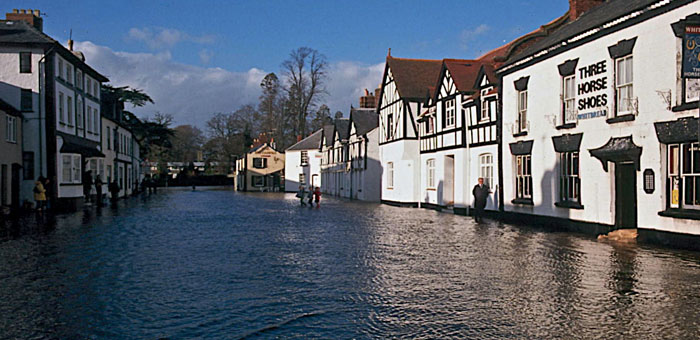
When the flood waters have receded what will be the legacy? What impact, if any, will the flooding have on the climate change agenda in UK politics?
There is now an increasing body of evidence, confirmed by the Met Office, that extreme daily rainfall rates are becoming more intense, in line with what is to be expected from climate change. Four of the five wettest years recorded in the UK have occurred from the year 2000 onwards. Over that same period, we have also had the seven warmest years.
Whilst there may still be some debate about the precise causes of the perfect storm that has caused unprecedented levels of flooding in the UK, what is indisputable is that the planet is warming. Lord Stern now contends that the risks of climate change are even greater than he anticipated in his 2006 report. A report last year by the IPCC shows with 95% certainty that carbon pollution from industrial activities has caused the planet to warm up.
Not very long ago, UK was a world leader in tackling the problem with strong cross party consensus. Only 5 MPs voted against the 2008 Climate Change Act. This set an example for other nations, and gave the UK considerable weight in international negotiations. However, the economic crisis took attention away, and key planks of the Government’s strategy for tackling climate change have been eroded.
The rolling back of green levies, a gas strategy that includes scenarios that breach our carbon budgets, the Green Deal launched with interest rates too high to attract its target market, Treasury blocks on power sector carbon budgets for 2030, and the looming Fourth Carbon Budget review. All of these threaten to undermine the UK’s ability to cut its emissions by at least 80% by 2050.
In a report last year the Green Alliance highlighted the real risk that regular assaults on the centre ground consensus were undermining two decades of steady progress. There has been a sharp decline in confidence in UK environmental policy, and as a result investment in green infrastructure has not reached its potential.
The commitment by each of the main parties has shown signs of wavering. The Prime Minister’s promise to lead the greenest government ever has been undermined by the Chancellor’s framing of high environmental standards as a threat to economic success. Despite strong statements on the green economy, Labour has not yet made it clear that climate change will be amongst its priorities going into the next election, choosing instead to focus on energy prices. The Lib Dems have failed to match their early promise, electricity market reform has been patchy.
The lack of focus on the issue by the main parties is perhaps mirrored by public attitudes. A recent report by the RSA highlights that the real danger is not with the climate change deniers, but with the climate change ignorers. While only a fifth (19.6%) are “unconvinced” about the reality of anthropogenic climate change, the majority of the population (63.9%) are “unmoved” in the sense that they don’t accept the full implications in terms of the need to take action.
What will it take to focus minds and galvanise sufficient effort to tackle the problem?
In the wake of the flooding a resumption of the core political argument around climate change is inevitable. The Prime Minister has re-asserted his commitment, emphasising his belief that recent weather calamities were connected to climate change, which is one of “the greatest threats” we face. Meanwhile, Labour Leader Ed Miliband has warned that climate change is now an issue of national security.
But how long will these sentiments last? We need to avoid a scenario where the political parties return to business as usual once the memory of the flood waters has sufficiently receded, and the threat of dangers posed by global warming become less immediate and visible in the course of day-to-day life.
Obama has framed the issue as a moral imperative. The fact is that our current response to the problem is heavily weighted by future discounting, and the poorest will suffer disproportionately as the direct result of anthropogenic climate change. Hard to imagine at the moment, but one of the more serious effects of climate change will be water scarcity, which already impacts people’s lives in many countries. A comprehensive study by the Potsdam Institute for Climate Impact Research published in December reveals that climate change puts 40% more people at risk of absolute water scarcity.
Will the moral imperative enough? I am reminded of a few lines in The Rime of the Ancient Mariner by Samuel Taylor Coleridge. “Water, water everywhere and all the boards did shrink. Water, water everywhere nor any drop to drink”. The clear moral of Coleridge’s tale is that we disrespect nature at our peril.
About the Author
This post was written by Claire Haigh. Founder & CEO of Greener Vision & Executive Director of the Transport Knowledge Hub. Claire was previously CEO of Greener Transport Solutions (2021-2022) and CEO of Greener Journeys (2009-2020).
